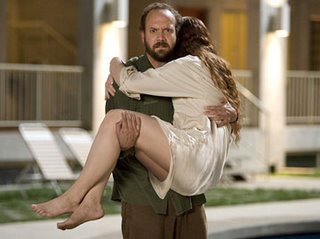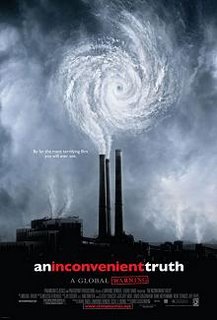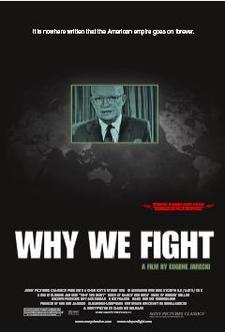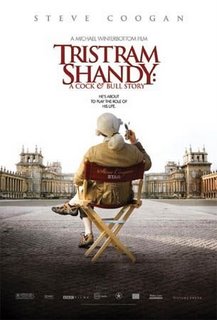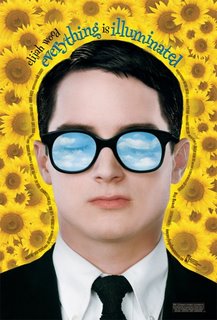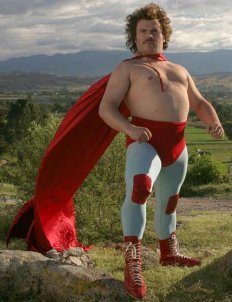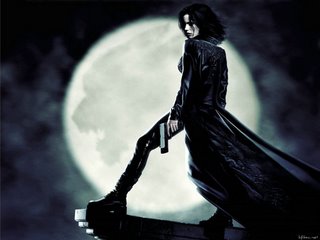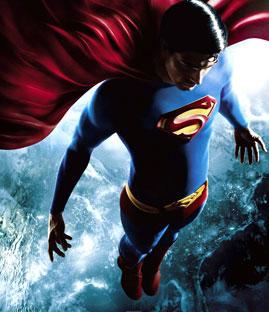
There’s an incredible scene in
Superman Returns where the Man of Steel has caught a gigantic globe--the Daily Planet, as a matter of fact--which only moments before had been falling from atop a skyscraper to a populated street below. As he lowers it gently to the ground, he takes on the iconic pose of Atlas, the Greek god who was tasked with keeping the world balanced upon his shoulders. In many ways, Superman had a similar task; one many felt he forfeited when he left Earth for five years in search of his obliterated home-world. Things got very bad in his absence.
To use a phrase made famous by Ayn Rand, Atlas shrugged.
But this film didn’t.
Superman Returns, while flawed, does not disgrace the mythology. Far from it. It is a bombastic, rousing, explosive burst of summer fun and fantasy, enriched by its predecessors and rejuvenated by the new blood and slavish religious devotion of director Bryan Singer.
I do not fully understand those who have felt the need to tear this film to pieces. Yes, certain characters, even main characters, fail to fully inspire emotionally. Yes, Kate Bosworth, though a fine actress, is totally miscast here. Yes, Spacey, while having his moments, does not come close to the gleeful wickedness of Gene Hackman. Yes, Luthor’s land-grab plot is, well, ridiculous.
But does anyone seriously believe that this film is worse than, shall we say,
Superman III or
IV? Worse than the film that would have been made with Nicholas Cage in the tights?
I defy anyone who says they did not get chills when John William’s score opened with the classic credits sequence or Marlon Brando’s voice wafted over the speakers or Superman recycled his line about the safety record of flying.
I am the first to slather the praise on Christopher Reeve. He was and still is the definitive Superman. When Reeve fell from that horse years ago, I was physically sickened. One of my heroes, an unfellable one at that, was felled. But Reeve is gone. And while that is a tragedy, we must judge this film on its own merits.
And it has more than enough merits to go around. There’s no other way to say it--this is a awe-inspiring film.
There are moments of immense and breathtaking beauty. Superman has never been more believable in flight. He moves with a grace and elegance we’ve never seen before. He is majesty in motion. When he is not soaring through the cosmos, he floats in it. There is a scene where, with Lois Lane draped in his arms, he drifts past the massive, aforementioned Daily Planet sphere that is, quite simply, poetry in motion. His home is the sky and when he rests, if he rests, it is hovering high over the globe, basking in the sunlight, listening to the world below him.
The special effects are jaw-dropping (though I recommend NOT seeing the film in a 3-D IMAX environment--while novel, the 3-D effect is muddled, distracting and lacks the sort of clarity for which you beg during effects-laden sequences). Jumbo jets plummet from the sky, a young Clark Kent discovers his powers, a luxury yacht comes to a titanic end, continents shift and earthquakes threaten to tear Metropolis apart. One very minor effect--Superman lowering a runaway car safely to the ground--is an iconic image taken directly from the early comics.
The special effects aren’t the only special thing on the screen. I loved watching Eva Marie Saint, an actress who stared in several of my favorite movies (
North by Northwest and
On the Waterfront) and who, in an odd six degrees of Superman, stared opposite Marlon Brando in the latter.
Although Brandon Routh, who is 26--the same age as Reeves when he first put on the cape--appears young, perhaps
just too young for the part, he mimics Reeve’s mannerisms and voice with astonishing panache--particularly as Clark Kent. That a no-name actor would be chosen to helm the biggest movie of the summer is a daring choice on Singer’s part. But it was the right choice. By the end of the film, Routh is Superman. (Sadly, the same cannot be said for Bosworth who is simply too young to inspire the necessary gravitas for her role).
Superman returns (though now he stands for “Truth, Justice...all that stuff” instead of “The American Way”--the result of the necessity for movie marketing overseas we’re told). The plot--about Lex Luthor’s attempt to grow an entirely new continental land mass from the same crystals that produced Superman’s Fortress of Solitude--is silly, I grant you, but, in many way, operates more like a sub-plot. The dominant emotional thread of this movie is far more Superman’s disappearance and what that means to humanity. And, of course, what it means to Lois Lane who has a young child who may not be the son of her current boyfriend as he’s been told. A grand piano will answer that question nicely.
This is a film primarily about fathers and sons--both how much we inherit from our fathers and our fathers’ desire that we grow to eclipse even them. This paternal imagery dove-tails into a strong use of Christian imagery. From his heavenly father’s opening line, “They can be a great people, if they wish to be. They only lack the light to show the way. For this reason above all--their capacity for good--I have sent them you, my only son” to a snatch of dialogue between Superman and Lois... :
Lois Lane: The world doesn't need a savior...
Superman: Listen...
Lois Lane: I don't hear anything.
Superman: I do. I hear everything. You wrote that the world doesn't need a savior, but every day I hear people crying for one.
...to a sacrificial beating Superman endures that plays like a scene cut from
The Passion of the Christ, to a heavenly ascension, etc. Singer sculpts and manipulates the Christian mythology into a form that works on a meta-religious level.
If past films emphasized Superman’s humanity, this one plays off of his divinity, going so far at one point as to refer to him as a god, and underscores the lonely gulf that must necessarily exist between the god and the people he loves and protects. Most superheroes are humans who have undergone some sort of transformation to make them into the supernatural beings that they are. Superman is unique in that his super powers are part of his very foundational nature; they define him.
Superman is also something else among summer movies: old-fashioned. I’m not just talking about the reuniting of characters first developed over 70 years ago, but of the manner in which the film was made. While very serious things occur, the violence rarely moves out of the realm of a cartoon. In fact, you can count the number of people who die in this film on one hand, and aside from one who passes from natural causes, all of them are bad guys. I don’t say this in some sort of smug, prudish, family-friendly rant, but as an acknowledgment of a film that, at its heart is playful, fun and harkens back to a time of simpler filmmaking--all without losing its very contemporary veneer.
Superman Returns, while not perfect, delivers everything it promised. It is a dazzling film crafted in the spirit of the comic books, filled with splashy effects, punctuated with larger-than-life characters, surprisingly tender, and rollicking fun.
You’ll leave the theater believing even you can fly.



